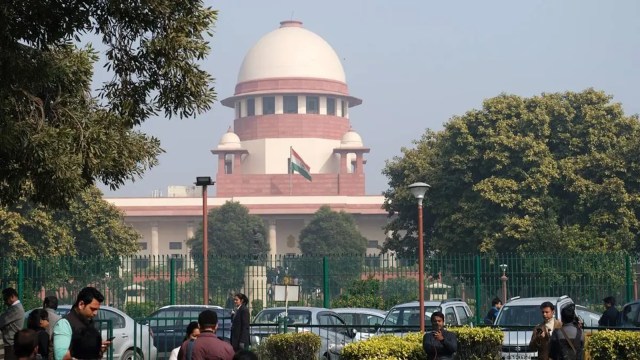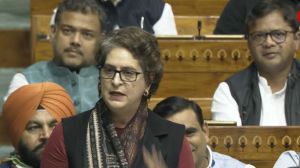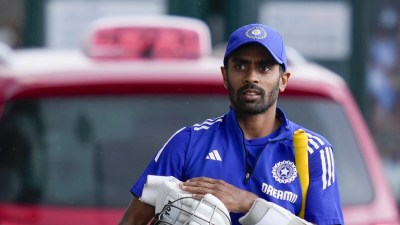Religious conversion merely to avail quota benefits without “actual belief” in the other religion would defeat the social ethos of the policy of reservation, the Supreme Court ruled Tuesday as it upheld a Madras High Court order denying Scheduled Caste certificate to a born Chrisitian woman who claimed to be a Hindu while seeking the certificate for an Upper Division Clerk job in Puducherry.
A bench of Justices Pankaj Mithal and R Mahadevan said that “in the instant case, the evidence presented clearly demonstrates that the appellant professes Christianity and actively practises the faith by attending church regularly”.

“Despite the same, she claims to be a Hindu and seeks for Scheduled Caste community certificate for the purpose of employment. Such a dual claim made by her is untenable and she cannot continue to identify herself as a Hindu after baptism,” the bench said. “Therefore, the conferment of Scheduled Caste communal status to the appellant, who is a Christian by religion, but claims to be still embracing Hinduism only for the purpose of availing reservation in employment, would go against the very object of reservation and would amount to fraud on the Constitution.”
A larger question on the constitutionality of using religion as a yardstick for Scheduled Caste quota is pending before the Supreme Court. The pleas essentially seek reservation for Dalit converts to Christianity and Islam. The 1950 Constitution (Scheduled Castes) Order issued by the President mandates SC status only for Hindus. For the purposes of reservation, Sikhs and Buddhists are also considered Hindus. In 2007, Justice Ranganath Mishra Commission report on Religious and Linguistic Minorities, had recommended Scheduled Caste quota for Dalit Christians and Muslims.
Writing for the bench on Tuesday, Justice Mahadevan said, “India is a secular country. Every citizen has a right to practise and profess a religion of their choice as guaranteed under Article 25 of the Constitution. One converts to a different religion, when he/she is genuinely inspired by its principles, tenets and spiritual thoughts. However, if the purpose of conversion is largely to derive the benefits of reservation but not with any actual belief in the other religion, the same cannot be permitted, as the extension of benefits of reservation to people with such ulterior motives will only defeat the social ethos of the policy of reservation.”
Appellant C Selvarani had challenged the January 24, 2023 order of the Madras High Court, which dismissed her writ petition.
She contended that she professes the Hindu religion and she belongs to Valluvan caste, which falls within the ambit of the The Constitution (Pondicherry) Scheduled Castes Order, 1964 and hence, she is entitled to get concession under the Adi Dravida quota. Selvarani argued that right from birth, she has affinity in professing Hinduism and has been going to temples and worshipping Hindu deities.
Story continues below this ad
The appellant submitted that through various documents, she had been able to prove that she was born to a Hindu father and a Christian mother, who also, after marriage, started to profess the Hindu religion; that her grandparents and great grandparents belonged to Valluvan caste. She also claimed that throughout her educational career, she was treated as belonging to the SC community and the transfer certificates also affirmed her communal status as such; and that her father, and her brother possessed SC certificates.
However, the bench which perused the facts of the case said “the report submitted by the Village Administrative Officer, after a detailed enquiry and through the documentary evidence collected” clearly establish that her father belonged to Scheduled Caste community and mother was a Christian and their marriage was performed as per the Christian rituals. It said that “thereafter, the appellant’s father had converted to Christianity through baptism; baptism of the appellant’s brother was done on 07.05.1989; and the appellant was born on 22.11.1990 and she was baptized on 06.01.1991 at Lourdes Shrine, Villianur, Pondicherry within two months”.
“Therefore, it is clear that the appellant was a born Christian and she would not be entitled to claim the certificate under Scheduled Caste category,” it said.
The bench said “the appellant and her family, if they really intended to get themselves converted, ought to have done some positive act to evince such conversion rather than a meek claim to be practising Hinduism”.
Story continues below this ad
“One of the methods of conversion is by adopting a procedure prescribed through the Arya Samaj. A public declaration to the effect of evincing conversion could also have been made,” it said.
The court rejected as “feeble” the woman’s argument that her baptism was done when she was less than three months old, saying “the same does not inspire our confidence as she did not make any attempt to cancel the registration of baptism nor she filed any declaratory suit in this regard”.
The court said that “the field verification clearly revealed the registration of the marriage of the parents of the appellant under the Indian Christian Marriage Act, 1872, the baptism of the appellant and her brother and also the fact that they had been regularly attending the church… There is nothing on record to show that she or her family has reconverted to Hinduism and on the contrary, there is a factual finding that the appellant still professes Christianity”.









